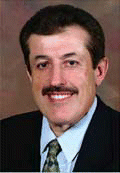The success of functional endoscopic sinus surgery (FESS) often depends on patient selection and expectations, according to several experts.
Explore This Issue
August 2008As otolaryngologists know, FESS is typically not a cure for chronic sinus disease. More often, it is a tool that helps long-term medications work more effectively. The mission is to make certain that patients understand and accept the surgery’s limitations. ENT Today conducted separate phone interviews with experts who presented a panel on FESS surgery failure at recent Triological Society section meetings. In the interviews, they discussed the reasons for FESS failure, predictive factors, preventive strategies, and ways to proceed after the surgery fails.
Goals of Sinus Surgery
I define the goals as symptom improvement and improvement of the disease itself, said John DelGaudio, MD, Associate Professor of Otolaryngology and Chief of Rhinology and Sinus Surgery at Emory University School of Medicine in Atlanta. If you take those things into account, failure can occur for different reasons.
Michael J. Sillers, MD, Director of the Alabama Nasal and Sinus Center in Birmingham, said that the surgery is considered unsuccessful if the patient has persistence, recurrence, or worsening of sinus symptoms or disease after sinus surgery.
Incomplete surgery, scar tissue formation, discontinuation of medical therapy, or disease progression can be reasons for FESS failure, Dr. Sillers said. Surgery can’t halt the natural history of the disease, so the precise role of surgery needs to be clearly understood.
FESS would be considered unsuccessful if after surgery, the patient still has symptoms that influence the quality of life and still has objective disease as documented by the exam or CT scan, said Stilianos Kountakis, MD, PhD, Vice Chair of Otolaryngology at Medical College of Georgia in Augusta, where he is Co-Director of Rhinology-Sinus Surgery. The main issue is how the patient feels, though, he stressed. I’m not treating the imaging study, I’m treating the patient, he said.
Dr. Kountakis agreed with Drs. DelGaudio and Sillers that an important first step is to understand the underlying problem. There are many different reasons for chronic rhinosinusitis, he said. Most of the time it’s not an infection, but inflammation due to several causes. Allergic rhinitis in patients with chronic rhinosinusitis should be treated appropriately to minimize all sources of sinonasal inflammation. Patients with allergic fungal rhinosinusitis require surgery to remove the fungal debris, and they require aggressive medical management afterward. Bacteria in the sinuses that produce toxins can cause severe inflammation. Others may have a genetic predisposition to sinus disease, as in patients with asthma.
 Explain to patients that they are having surgery because their disease can’t be managed with medications and that the goal of surgery is to make the disease manageable with medications again.
Explain to patients that they are having surgery because their disease can’t be managed with medications and that the goal of surgery is to make the disease manageable with medications again.-Brent Senior, MD
Patient Selection and Counseling
Helping patients understand the nature of [sinus] disease is a critical component of preventing their disappointment in FESS, said Brent Senior, MD, Chief of Rhinology, Allergy, and Sinus Surgery at the University of North Carolina in Chapel Hill. It’s critical for patients to understand that chronic sinus disease is a disease that is always with you, that it can wax and wane in severity. Surgery can make it a milder disease to live with, but it does not necessarily cure the sinus disease.
Leave a Reply